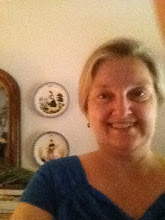

Our camera is great. It is helping us chronicle the daily life of our trip, helping our memory recall sights and sounds, events and insights. We are constantly changing lenses, though and it can sometimes drive us a little crazy. The problem is that there is a proper distance essential for seeing things. Physical distance from an object determines what we will see. Too far and you can see generalities and context; to close, and what detail there is might be a blur and there's no context. There is an neutral distance where there is some detail yet we can see the relation of the object to its environment. I love the "magnifying glass effect" I get with the telephoto lens when photographing a glorious blossom or budding hawthorn.
Then there are the panoramic pictures of the English landscape or the Jungle hills so difficult to take because they always seem to fall short of the reality. How can you capture that sense of smallness and "creatureliness" that you feel when standing under a great blue sky or see a horizon full of miles of green grass terminate at the field's edge under your feet? Or how can your lens take in the enormity of a waterfall not seen until you are upon it?
I have coped with this problem sometimes by taking a tiny piece of the large picture, a component, looking at its smallest parts rather than trying to describe what is too big to take in. I take a veil of water falling over rock instead of the waterfall, or the hedge row with the field in back of it instead of the field with a bit of hedge row. By doing this I try to let the enormity of what I see speak for itself. After all, that feeling of creatureliness is often a composite feeling, made up of seemingly random views that combine to give a sense of scale, a glimpse of a world here long before and long after us, a world of limitless space that by contrast makes us treasure the slightly squishy mud under our feet, the dry curls of last years grass being quickly overtaken by the lush crown of green sprouting underneath them. It is reassuring to be on the side of the grass and growing things. The "world" is too large and multiple to understand. If we understand that we are creatures of the world, not its creators, the enormity of creation is laid before us in all its richness and complexity. We do not saddle ourselves with an impossible description. We can see with the eyes of a creature. We can see little pieces of creation like a garden or a child or a friend and wonder at them or care for them.
Creatureliness is the same no matter what your age. The feeling is the same one I had when I was five. Time seems to be irrelevant to the concept. In fact time seems to collapse under it. That the feeling can connect the years of your life in a short circuit is part of the wonder I think. Of how many things in this world can you say that?

No comments:
Post a Comment